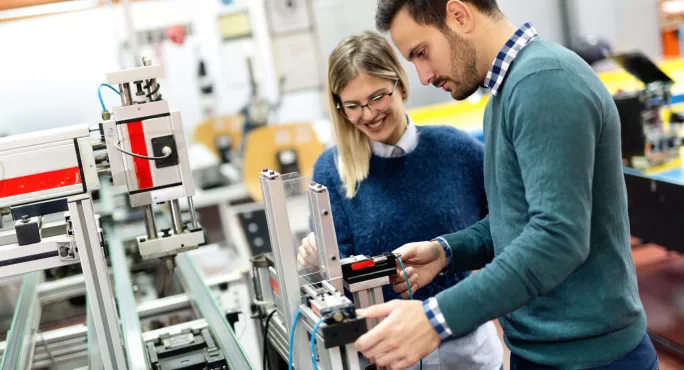
Levelling up: How we can make training world-class

We face a new imperative as we seek to recover from the global pandemic: to create a world-class skills economy for the UK.
Building a world-class skills economy, particularly for key sectors that are internationally traded, means recognising the crucial role that the FE sector must play in helping to secure our economic future in an increasingly competitive environment globally. We have to keep up with other global economies that are already valuing high-quality skills as key to their competitiveness, productivity and prosperity.
And the time for us to act is now, as governments across the UK are reforming skills systems, putting high-quality skills at the heart of economic recovery. And all of this chimes with the changing public mood. Our recent polling confirmed that there is broad support for high-quality technical education and apprenticeships, with almost three-quarters of people saying it should be a government priority.
News: Gavin Williamson says not valuing FE would be a ‘calamity’
Kate Green: Post-16 plans ‘close the door on millions’
More: Why colleges are the key to a fairer, greener economy
As a member of WorldSkills, the global hub of skills excellence, we have witnessed the transformation of skills systems in China, Russia, South Korea and Singapore as they used their membership of WorldSkills to mainstream global industry standards into their training. That is why we are radically reshaping what we do, so we can use our unique asset to help build the foundations of a world-class skills economy.
Building a world-class skills economy
We have made a commitment to turn our extensive experience of helping to train young people to achieve world-class standards through competitions-based training to support further quality improvement across the skills systems. We know that raising teaching quality through our training experts, who know how to achieve world-class standards, is what college leaders want, too. The launch of our Centre of Excellence, run in partnership with NCFE, met clear pent-up demand from college leaders with over a quarter of colleges in the UK seeking to be part of the first year.
We are now extending our reach in three ways to harness our worldwide connections to help mainstream global best practice to boost standards of teaching in technical education and apprenticeships and meet employer demand for developing the next generation of high-quality technicians that the economy needs.
Firstly, we are announcing a raft of global partnerships with other leading world economies that will leverage more international best practice and knowledge exchange. Our first partnerships have been agreed with Taiwan and South Korea and, in total, we will be announcing 11 partnerships with countries including Japan, Russia, China and France by the end of this year. These partnerships will cover key areas such as benchmarking best practice, professional development and peer exchange, joint training and virtual pressure tests and working together to raise the prestige and profile of technical and vocational education and training (TVET). These activities will feed directly into our work on developing world-class standards throughout the UK through our partnership networks.
Secondly, we are now inviting more colleges, ITPs and employer providers to be part of the second year of the Centre of Excellence. The impact of this UK-wide programme was recognised by the government in its recent White Paper for England - Skills for Jobs - and we are working with the governments in Scotland, Wales and Northern Ireland to further build on this work. In addition, our growing Innovation Network is enabling more colleges throughout the UK to access our data from our international benchmarking to support them in raising standards. We currently work with 90 per cent of all colleges and have in-depth working partnerships with 25 per cent of colleges through our Centre of Excellence and Innovation Network programmes, but we know that to help deliver a world-class skills economy we must do more.
New taskforce
Thirdly, our international partnerships and our work with partners in the Centre of Excellence and Innovation Network will play a key role in helping to shape the work of the new Skills Taskforce for Global Britain, which we have commissioned. Announced in Tes, the taskforce will be chaired by John Cridland CBE, former director-general of the CBI business group, and includes consultancy firm EY as a founding member. The taskforce will develop a Roadmap to 2030, so that by the end of this decade the world-class quality of our skills will be recognised globally. This will help employers to attract more foreign direct investment in internationally traded sectors such as green tech, digital and advanced manufacturing, boosting job creation and sustaining economic growth across the country.
I know that more and more sector leaders are committed to working with us to help more young people, from all backgrounds, get the best start in work and life by helping to meet the ever-higher standards demanded by employers. And by working ever more closely together, I believe we can a make a world-class skills economy a reality across the UK’s regions and nations, delivering success and prosperity for more young people, educators and employers.
Dr Neil Bentley-Gockmann is the chief executive of WorldSkills UK
You need a Tes subscription to read this article
Subscribe now to read this article and get other subscriber-only content:
- Unlimited access to all Tes magazine content
- Exclusive subscriber-only stories
- Award-winning email newsletters
- Unlimited access to all Tes magazine content
- Exclusive subscriber-only stories
- Award-winning email newsletters
You need a subscription to read this article
Subscribe now to read this article and get other subscriber-only content, including:
- Unlimited access to all Tes magazine content
- Exclusive subscriber-only stories
- Award-winning email newsletters
- Unlimited access to all Tes magazine content
- Exclusive subscriber-only stories
- Award-winning email newsletters